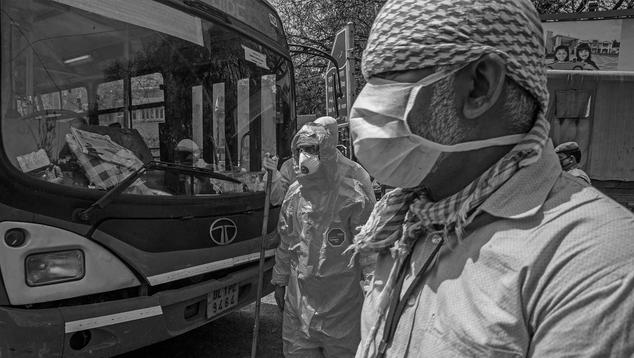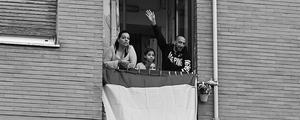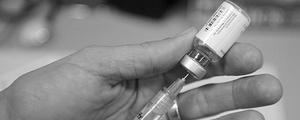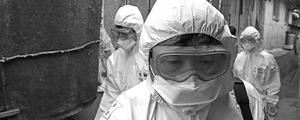Indian Prime Minister Narendra Modi enacted the world's largest and most stringent nationwide lockdown last week, banning 1.3 billion people from leaving their homes for 21 days in hopes of halting the spread of COVID-19. While the next few weeks of the lockdown will be full of hardship for many Indians, including the millions who have lost their jobs and fled the cities to return home, the effort's success in flattening the curve will hinge on Indians' continued trust in their country's medical professionals and in their government.
According to the Wellcome Global Monitor survey conducted in India in 2018 before the pandemic, Indians have relatively high levels of trust in the country's medical workers and their government, and in the medical advice and health information they give. Case in point, more than nine in 10 in India say they trust doctors and nurses "a lot" or "some," with about two in three (67%) -- the highest percentage in South Asia -- saying they have "a lot" of trust in them.
| A lot | Some | Total | |||||||||||||||||||||||||||||||||||||||||||||||||||||||||||||||||||||||||||||||||||||||||||||||||
|---|---|---|---|---|---|---|---|---|---|---|---|---|---|---|---|---|---|---|---|---|---|---|---|---|---|---|---|---|---|---|---|---|---|---|---|---|---|---|---|---|---|---|---|---|---|---|---|---|---|---|---|---|---|---|---|---|---|---|---|---|---|---|---|---|---|---|---|---|---|---|---|---|---|---|---|---|---|---|---|---|---|---|---|---|---|---|---|---|---|---|---|---|---|---|---|---|---|---|---|
| % | % | % | |||||||||||||||||||||||||||||||||||||||||||||||||||||||||||||||||||||||||||||||||||||||||||||||||
| India | 67 | 25 | 92 | ||||||||||||||||||||||||||||||||||||||||||||||||||||||||||||||||||||||||||||||||||||||||||||||||
| Sri Lanka | 50 | 43 | 93 | ||||||||||||||||||||||||||||||||||||||||||||||||||||||||||||||||||||||||||||||||||||||||||||||||
| Bangladesh | 44 | 46 | 90 | ||||||||||||||||||||||||||||||||||||||||||||||||||||||||||||||||||||||||||||||||||||||||||||||||
| Afghanistan | 43 | 30 | 73 | ||||||||||||||||||||||||||||||||||||||||||||||||||||||||||||||||||||||||||||||||||||||||||||||||
| Nepal | 38 | 52 | 90 | ||||||||||||||||||||||||||||||||||||||||||||||||||||||||||||||||||||||||||||||||||||||||||||||||
| Pakistan | 36 | 49 | 85 | ||||||||||||||||||||||||||||||||||||||||||||||||||||||||||||||||||||||||||||||||||||||||||||||||
| Wellcome Global Monitor, 2018 | |||||||||||||||||||||||||||||||||||||||||||||||||||||||||||||||||||||||||||||||||||||||||||||||||||
A similarly high 86% of Indians also say they trust the medical advice and health information they get from medical workers such as nurses and doctors a lot or some. Perhaps what is most telling, and relevant in light of the government's recent steps, is that Indians have this same level of trust in the medical advice and health information that comes from their government. More than eight in 10 Indians (84%) say they have a lot of or some trust in the information their government gives them, with four in 10 (40%) saying "a lot."
| A lot | Some | Total | |||||||||||||||||||||||||||||||||||||||||||||||||||||||||||||||||||||||||||||||||||||||||||||||||
|---|---|---|---|---|---|---|---|---|---|---|---|---|---|---|---|---|---|---|---|---|---|---|---|---|---|---|---|---|---|---|---|---|---|---|---|---|---|---|---|---|---|---|---|---|---|---|---|---|---|---|---|---|---|---|---|---|---|---|---|---|---|---|---|---|---|---|---|---|---|---|---|---|---|---|---|---|---|---|---|---|---|---|---|---|---|---|---|---|---|---|---|---|---|---|---|---|---|---|---|
| % | % | % | |||||||||||||||||||||||||||||||||||||||||||||||||||||||||||||||||||||||||||||||||||||||||||||||||
| Medical workers, such as doctors and nurses | 45 | 41 | 86 | ||||||||||||||||||||||||||||||||||||||||||||||||||||||||||||||||||||||||||||||||||||||||||||||||
| The government of India | 40 | 44 | 84 | ||||||||||||||||||||||||||||||||||||||||||||||||||||||||||||||||||||||||||||||||||||||||||||||||
| Wellcome Global Monitor, 2018 | |||||||||||||||||||||||||||||||||||||||||||||||||||||||||||||||||||||||||||||||||||||||||||||||||||
Indians' trust in health advice from both medical professionals and the country's government compares favorably with the other rapidly emerging economies of the BRICS countries (Brazil, Russia, India, China and South Africa). India leads the BRICS countries in confidence for both, with trust levels higher than the median of 80% for trust in advice from medical professionals and the 65% median trust in medical advice from the government.
Whom Do Indians Trust Most for Medical Advice?
As is the case in most parts of the world, Indians trust their medical professionals most for medical or health advice. More than three in four Indians (77%) say they trust "a doctor or nurse" most for this type of advice. "Family and friends" place a distant second, with 15% of the Indian public saying they trust this group most for medical advice.
| A doctor or nurse | Your family and friends | A famous person | A religious leader | ||||||||||||||||||||||||||||||||||||||||||||||||||||||||||||||||||||||||||||||||||||||||||||||||
|---|---|---|---|---|---|---|---|---|---|---|---|---|---|---|---|---|---|---|---|---|---|---|---|---|---|---|---|---|---|---|---|---|---|---|---|---|---|---|---|---|---|---|---|---|---|---|---|---|---|---|---|---|---|---|---|---|---|---|---|---|---|---|---|---|---|---|---|---|---|---|---|---|---|---|---|---|---|---|---|---|---|---|---|---|---|---|---|---|---|---|---|---|---|---|---|---|---|---|---|
| % | % | % | % | ||||||||||||||||||||||||||||||||||||||||||||||||||||||||||||||||||||||||||||||||||||||||||||||||
| All Indians | 77 | 15 | 4 | 1 | |||||||||||||||||||||||||||||||||||||||||||||||||||||||||||||||||||||||||||||||||||||||||||||||
| Urban | 70 | 21 | 5 | 2 | |||||||||||||||||||||||||||||||||||||||||||||||||||||||||||||||||||||||||||||||||||||||||||||||
| Rural | 78 | 14 | 3 | 1 | |||||||||||||||||||||||||||||||||||||||||||||||||||||||||||||||||||||||||||||||||||||||||||||||
| Wellcome Global Monitor, 2018 | |||||||||||||||||||||||||||||||||||||||||||||||||||||||||||||||||||||||||||||||||||||||||||||||||||
While there is little difference in levels of trust in medical professionals and medical advice between urban- and rural-dwelling Indians, there are differences in whom they trust most for medical advice. Both groups are still most likely to cite medical professionals as their most trusted source of advice. However, urban Indians are more likely than the rural population to say friends and family are their most trusted sources of advice, 21% vs. 14%.
Bottom Line
Trust will play a key role in the success of India's attempt to stem the tide of the coronavirus. But will high levels of trust be enough amid the tremendous hardship they will have to endure?
Trust in family and friends to provide medical and health advice may lead Indians to rely on misinformation. More than one in five (21%) Indians living in urban areas say they trust family and friends most for medical advice, but misinformation through WhatsApp was reported to have led to mob killings in the country this year; and the BBC described the app as "the 'black hole' of fake news in India's election" last year. This is only exacerbated by the fact that social distancing enforcement has pushed droves to social media to stay connected.
Fear about COVID-19 has already been identified as causing discrimination targeting medical professionals in the country. This fear, combined with the pressure created by the economic impact of the lockdown, could create a fertile environment for the spread of fake news via social media. This would undermine trust in medical professionals and advice from the government, potentially compromising the efforts to control the spread of the disease.





